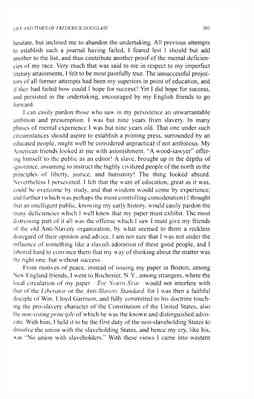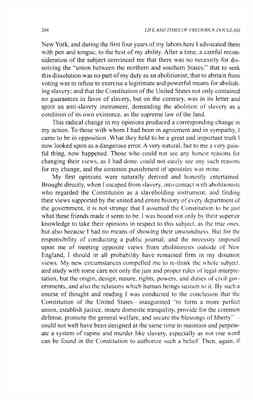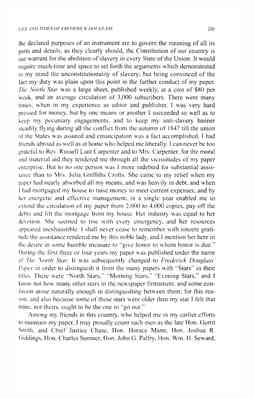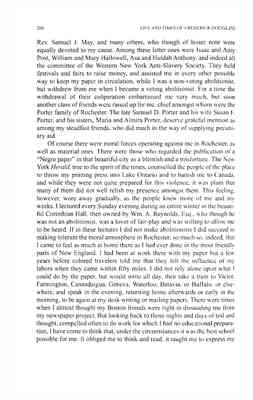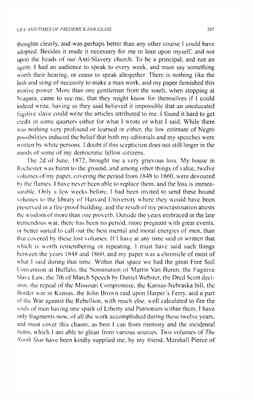Pages
51
LIFE AND TIMES OF FREDERICK DOUGLASS 203
hesitate, but inclined me to abandon the undertaking. All previous attempts to establish such a journal having failed, I feared lest I should but add another to the list, and thus contribute another proof of the mental deficiencies of my race. Very much that was said to me in respect to my imperfect literary attainments, I felt to be most painfully true. The unsuccessful projectors of all former attempts had been my superiors in point of education, and if they had failed how could I hope for success? Yet I did hope for success, and persisted in the undertaking, encouraged by my English friends to go forward.
I can easily pardon those who saw in my persistence an unwarrantable ambition and presumption. I was but nine years from slavery. In many phases of mental experience I was but nine years old. That one under such circumstances should aspire to establish a printing press, surrounded by an educated people, might well be considered unpractical if not ambitious. My American friends looked at me with astonishment. "A wood-sawyer'' offering himself to the public as an editor! A slave, brought up in the depths of ignorance, assuming to instruct the highly civilized people of the north in the principles of liberty, justice, and humanity! The thing looked absurd. Nevertheless I persevered. I felt that the want of education, great as it was, could be overcome by study, and that wisdom would come by experience; and further (which was perhaps the most controlling consideration) I thought that an intelligent public, knowing my early history, would easily pardon the many deficiencies which I well knew that my paper must exhibit. The most distressing part of it all was the offense which I saw I must give my friends of the old Anti-Slavery organization, by what seemed to them a reckless disregard of their opinion and advice. I am not sure that I was not under the influence of something like a slavish adoration of these good people, and I labored hard to convince them that my way of thinking about the matter was the right one, but without success.
From motives of peace, instead of issuing my paper in Boston, among New England friends, I went to Rochester, N. Y., among strangers, where the local circulation of my paper — THE NORTH STAR — would not interfere with that of the Liberator of the Anti-Slavery Standard, for I was then a faithful disciple of Wm. Lloyd Garrison, and fully committed to his doctrine touching the pro-slavery character of the Constitution of the United States, also the non-voting principle of which he was the known and distinguished advocate. With him, I held it to be the first duty of the non-slaveholding States to dissolve the union with the slaveholding States, and hence my cry, like his, was "No union with slaveholders." With these views I came into western
52
204 LIFE AND TIMES OF FREDERICK DOUGLASS
New York, and during the first four years of my labors here I advocated them with pen and tongue, to the best of my ability. After a time, a careful reconsideration of the subject convinced me that there was no necessity for dissolving the "union between the northern and southern States;" that to seek this dissolution was no part of my duty as an abolitionist; that to abstain from voting was to refuse to exercise a legitimate and powerful means for abolishing slavery; and that the Constitution of the United States not only contained no guarantees in favor of slavery, but on the contrary, was in its letter and spirit an anti-slavery instrument, demanding the abolition of slavery as a condition of its own existence, as the supreme law of the land.
This radical change in my opinions produced a corresponding change in my action. To those with whom I had been in agreement and in sympathy, I came to be in opposition. What they held to be a great and important truth I now looked upon as a dangerous error. A very natural, but to me a very painful thing, now happened. Those who could not see any honest reasons for changing their views, as I had done, could not easily see any such reasons for my change, and the common punishment of apostates was mine.
My first opinions were naturally derived and honestly entertained. Brought directly, when I escaped from slavery, into contact with abolitionists who regarded the Constitution as a slaveholding instrument, and finding their views supported by the united and entire history of every department of the government, it is not strange that I assumed the Constitution to be just what these friends made it seem to be. I was bound not only by their superior knowledge to take their opinions in respect to this subject, as the true ones, but also because I had no means of showing their unsoundness. But for the responsibility of conducting a public journal, and the necessity imposed upon me of meeting opposite views from abolitionists outside of New England, I should in all probability have remained firm in my disunion views. My new circumstances compelled me to re-think the whole subject, and study with some care not only the just and proper rules of legal interpretation, but the origin, design, nature, rights, powers, and duties of civil governments, and also the relations which human beings sustain to it. By such a course of thought and reading I was conducted to the conclusion that the Constitution of the United States — inaugurated "to form a more perfect union, establish justice, insure domestic tranquility, provide for the common defense, promote the general welfare, and secure the blessings of liberty" — could not well have been designed at the same time to maintain and perpetuate a system of rapine and murder like slavery, especially as not one word can be found in the Constitution to authorize such a belief. Then, again, if
53
LIFE AND TIMES OF FREDERICK DOUGLASS 205
the declared purposes of an instrument are to govern the meaning of all its parts and details, as they clearly should, the Constitution of our country is our warrant for the abolition of slavery in every State of the Union. It would require much time and space to set forth the arguments which demonstrated to my mind the unconstitutionality of slavery: but being convinced of the fact my duty was plain upon this point in the further conduct of my paper. The North Star was a large sheet, published weekly, at a cost of $80 per week, and an average circulation of 3,000 subscribers. There were many times, when in my experience as editor and publisher, I was very hard pressed for money, but by one means or another I succeeded so well as to keep my pecuniary engagements, and to keep my anti-slavery banner steadily flying during all the conflict from the autumn of 1847 till the union of the States was assured and emancipation was a fact accomplished. I had friends abroad as well as at home who helped me liberally. I can never be too grateful to Rev. Russell Lant Carpenter and to Mrs. Carpenter, for the moral and material aid they tendered me through all the vicissitudes of my paper enterprise. But to no one person was I more indebted for substantial assistance than to Mrs. Julia Griffiths Crofts. She came to my relief when my paper had nearly absorbed all my means, and was heavily in debt, and when I had mortgaged my house to raise money to meet current expenses: and by her energetic and effective management, in a single year enabled me to extend the circulation of my paper from 2,000 to 4,000 copies, pay off the debts and lift the mortgage from my house. Her industry was equal to her devotion. She seemed to rise with every emergency, and her resources appeared inexhaustible. I shall never cease to remember with sincere gratitude the assistance rendered me by this noble lady, and I mention her here in the desire in some humble measure to "give honor to whom honor is due." During the first three or four years my paper was published under the name of The North Star. It was subsequently changed to Frederick Douglass' Paper in order to distinguish it from the many papers with "Stars" in their titles. There were "North Stars," "Morning Stars," "Evening Stars," and I know not how many other stars in the newspaper firmament, and some confusion arose naturally enough in distinguishing between them; for this reason, and also because some of these stars were older than my star I felt that mine, not theirs, ought to be the one to "go out."
Among my friends in this country, who helped me in my earlier efforts to maintain my paper, I may proudly count such men as the late Hon. Gerrit Smith, and Chief Justice Chase, Hon. Horace Mann, Hon. Joshua R. Giddings, Hon. Charles Sumner, Hon. John G. Paltry, Hon. Wm. H. Seward,
54
206 LIFE AND TIMES OF FREDERICK DOUGLASS
Rev. Samuel J. May, and many others, who though of lesser note were equally devoted to my cause. Among these latter ones were Isaac and Amy Post, William and Mary Hallowell, Asa and Huldah Anthony, and indeed all the committee of the Western New York Anti-Slavery Society. They held festivals and fairs to raise money, and assisted me in every other possible way to keep my paper in circulation, while I was a non-voting abolitionist, but withdrew from me when I became a voting abolitionist. For a time the withdrawal of their cooperation embarrassed me very much, but soon another class of friends were raised up for me, chief amongst whom were the Porter family of Rochester. The late Samuel D. Porter and his wife Susan F. Porter, and his sisters, Maria and Almira Porter, deserve grateful mention as among my steadfast friends, who did much in the way of supplying pecuniary aid.
Of course there were moral forces operating against me in Rochester, as well as material ones. There were those who regarded the publication of a "Negro paper" in that beautiful city as a blemish and a misfortune. The New York Herald, true to the spirit of the times, counselled the people of the place to throw my printing press into Lake Ontario and to banish me to Canada, and while they were not quite prepared for this violence, it was plain that many of them did not well relish my presence amongst them. This feeling, however, wore away gradually, as the people knew more of me and my works. I lectured every Sunday evening during an entire winter in the beautiful Corinthian Hall, then owned by Wm. A. Reynolds. Esq., who though he was not an abolitionist, was a lover of fair-play and was willing to allow me to be heard. If in these lectures I did not make abolitionists I did succeed in making tolerant the moral atmosphere in Rochester; so much so, indeed, that I came to feel as much at home there as I had ever done in the most friendly parts of New England. I had been at work there with my paper but a few years before colored travelers told me that they felt the influence of my labors when they came within fifty miles. I did not rely alone upon what I could do by the paper, but would write all day, then take a train to Victor, Farmington, Canandaigua, Geneva, Waterloo, Batavia, or Buffalo, or elsewhere, and speak in the evening, returning home afterwards or early in the morning, to be again at my desk writing or mailing papers. There were times when I almost thought my Boston friends were right in dissuading me from my newspaper project. But looking back to those nights and days of toil and thought, compelled often to do work for which I had no educational preparation, I have come to think that, under the circumstances it was the best school possible for me. It obliged me to think and read, it taught me to express my
55
LIFE AND TIMES OF FREDERICK DOUGLASS 207
thoughts clearly, and was perhaps better than any other course I could have adopted. Besides it made it necessary for me to lean upon myself, and not upon the heads of our Anti-Slavery church. To be a principal, and not an agent. I had an audience to speak to every week, and must say something worth their hearing, or cease to speak altogether. There is nothing like the lash and sting of necessity to make a man work, and my paper furnished this motive power. More than one gentleman from the south, when stopping at Niagara, came to see me, that they might know for themselves if I could indeed write, having as they said believed it impossible that an uneducated fugitive slave could write the articles attributed to me. I found it hard to get credit in some quarters either for what I wrote or what I said. While there was nothing very profound or learned in either, the low estimate of Negro possibilities induced the belief that both my editorials and my speeches were written by white persons. I doubt if this scepticism does not still linger in the minds of some of my democratic fellow-citizens.
The 2d of June, 1872, brought me a very grievous loss. My house in Rochester was burnt to the ground, and among other things of value, twelve volumes of my paper, covering the period from 1848 to 1860, were devoured by the flames. I have never been able to replace them, and the loss is immeasurable. Only a few weeks before, I had been invited to send these bound volumes to the library of Harvard University where they would have been preserved in a fire-proof building, and the result of my procrastination attests the wisdom of more than one proverb. Outside the years embraced in the late tremendous war, there has been no period, more pregnant with great events, or better suited to call out the best mental and moral energies of men, than that covered by these lost volumes. If I have at any time said or written that which is worth remembering or repeating, I must have said such things between the years 1848 and 1860, and my paper was a chronicle of most of what I said during that time. Within that space we had the great Free Soil Convention at Buffalo, the Nomination of Martin Van Buren, the Fugitive Slave Law, the 7th of March Speech by Daniel Webster, the Dred Scott decision, the repeal of the Missouri Compromise, the Kansas-Nebraska bill, the Border war in Kansas, the John Brown raid upon Harper's Ferry, and a part of the War against the Rebellion, with much else, well calculated to fire the souls of men having one spark of Liberty and Patriotism within them. I have only fragments now, of all the work accomplished during these twelve years, and must cover this chasm, as best I can from memory and the incidental items, which I am able to glean from various sources. Two volumes of The North Star have been kindly supplied me, by my friend, Marshall Pierce of
